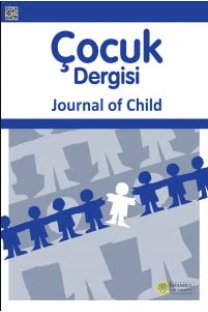Beslenme sorunu olan çocuklara ekip yaklaşımı ile elde edilen sonuçlar
Çocuk, Enerji alımı, Psikoloji, Büyüme ve gelişme
Results obtained by multidisciplinary approach to children with feeding difficulty
Child, Energy Intake, Psychology, Growth and Development,
___
- 1.Skuse D. Identification and management of problem eaters. Arch Dis Child 1993: 69: 604-8.
- 2.Hutchinson H. Feeding problems in young children: report of three cases and review of the literature. J Hum Nutr Diet 1999: 12:337-43.
- 3.Southall A, Sahwartz A. Feeding problems in children, preface. In: Southall A, Sahwartz A eds. Feeding Problems in Children. Oxon:Radcliffe Medical Press, 2000: v-vii.
- 4.Blissett J, Harris G, Kirk J. Effect of growth hormone therapy on feeding problems and food intake in children with growth disorders. Acta Paediatr Scand 2000: 89: 644-9.
- 5.Blissett J, Harris G. A behaviorial intervention in a child with feeding problems. J Hum Nutr Diet 2002: 15: 255-60.
- 6.Jacobi C, Agras WS, Hammer L. Predicting children's repor ted eating disturbances at 8 years of age. J Am Acad Child Adolesc Psyciatry 2001; 40:364-72.
- 7.Satter EM. Childhood eating disorders. J Am Diet Assoc 1986; 86: 357-61.
- 8.Rudolf CD, Link DT. Feeding disorders in infants and child ren. Pediatr Clin North Am 2002; 49: 97-112.
- 9.Douglas JE, Bryon M. Interview data on severe behavioural eating difficulties in young children. Arch Dis Child 1996; 75: 304-8.
- 10.Raynor P, Rudolf MC. What do we know about children who fail to thrive? Child Care Health Dev 1996; 22: 241-50.
- 11.Kessler DB. Failure to thrive and pediatric undernutrition:Historical and theoretical.context. In: Kessler DB, Dawson P, eds. Failure to Thrive and Pediatric Undernutrition. A Transdisciplinary approach. Baltimore: Brookes Publishing. 1999: 3.
- 12.Essex C. Children with feeding difficulties:medical perspectives. In: Southall A, Sahwartz A eds. Feeding Problems in Children. Oxon: Radcliffe Medical Press, 2000: 25-41.
- 13.Kerwin ME. Empirically supported treatments in pediatric psychology:severe feeding problems. J Pediatr Psychol 1999; 24: 193-216.
- 14.Pagano JL. Parental perceptions of feeding young children with developmentel and eating problems. The University of Connecticut. Doctorate dissertation. Connecticut, 2000.
- 15.Beslenme Bilgi Sistemi (BEBİS) 4. versiyon. İstanbul. 2004.
- 16.Dietary reference intakes for energy, carbohydrate, fiber, fat, fatty acids, cholesterol, protein and amino acids. The National Academy Press. Washington, DC. 2002.
- 17.Monje-Rojas R. Dietary intake as a cardiovascular risk factor in Costa Rican adolescents. J Adolescent Health 2001; 28:328-37.
- 18.Bundak R, Neyzi O. Büyüme. In: Neyzi O, Ertuğrul T, eds. Pediatri 1. Istanbul: Nobel Tip Kitabevleri, 3. Baskı, 2002:85-99.
- 19.Saner G. Beslenme durumunun değerlendirilmesi. In: Neyzi O, Ertuğrul T, eds. Pediatri 1. İstanbul: Nobel Tıp Kitabevleri, 3. Baskı, 2002:204-9.
- 20.Sanders MR, Patel RK, Le Grice B, et al. Children with persistent feeding difficulties:An observational analysis of the feeding interactions of problem and non-problem eaters. Health Psychol 1993; 12: 64-73.
- 21.Blissett J, Harris G, Kirk J. Feeding problems in Silver-Russell syndrome. Dev Med Child Neurol 2001; 43: 39-44.
- 22.Gökçay G, Garibağaoğlu M. Sık görülen genel beslenme sorunları, in: Gökçay G, Garibağaoğlu M, eds. Çocukluk ve Ergenlik Döneminde Beslenme. İstanbul: Saga Yayınları, 2002: 133-44.
- 23.Ohlsson A. Non-organic failure to thrive. Child Abuse Neglect 1979; 3: 449-59.
- 24.Underdown A. When feeding fails. Community Practit 2000; 73:713-14.
- 25.Thommessen M, Heiberg A, Kase BF. Feeding problems in children with congenital heart ndisease:the impact on energy intake and growth outcome. Eur JClin Nutr 1992; 76: 457-64.
- 26. Stark LJ, Povers SW, Jalalian E, et al. Modifying problematic mealtime interactions of children with cystic fibrosis and their parents via behavioral parent training. J Pediat Psychol 1(18) 994; 19: 751-68.
- ISSN: 1302-9940
- Yayın Aralığı: 4
- Başlangıç: 2000
- Yayıncı: İstanbul Üniversitesi
Turner sendromunda tanı ve tedavi
Abdullah BEREKET, Behzat ÖZKAN, Selim KURTOĞLU
Beslenme sorunu olan çocuklara ekip yaklaşımı ile elde edilen sonuçlar
Muazzez GARİBAĞAOĞLU, REYHAN SAYDAM, Gülbin GÖKÇAY, YUSUF SAHİP
Rombensefalospinapsis: İki vakanın klinik ve kraniyal MRG özellikleri
Sema SALTIK, Sibel SEVÜK, Müferet ERGÜVEN
Gaziantep'te yaşayan çocuklarda hepatit B virusu serolojisi
Bupivakain, fibrin yapıştırıcı ve deksametazon'un tonsillektomi sonrası oluşan ağrıya etkisi
Bir çocuk vakada mandibulada Brown tümörü: Kronik böbrek yetersizliğinin ender bir komplikasyonu
Yavuz Alev YILMAZ, Banu SADIKOĞLU, Ilmay BİLGE, Sevinç EMRE, Misten DEMİRYONT, Aydan ŞİRİN
Çocuklarda hepatosplenomegali nedenleri
Saadet AKARSU, Abdullah KURT, Ceren KARA, Çıtak A. Neşe KURT, Mustafa AYDIN, Erdal YILMAZ
Tüberküloz'a bağlı reaktif artrit (Poncet Hastalığı): Vaka sunumu
Murat DEVECİ, Melih Y. EROL, Müferet ERGÜVEN
Geç tanılı 27 homosistinüri vakasının klinik ve biyokimyasal değerlendirilmesi
